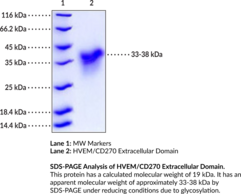Territorial Availability: Available through Bertin Technologies only in France
- Correlated keywords
- CD 270 160 HEK 293 TNFRSF 14 TR 2 proinflammatory auto immune
- Product Overview:
Herpes virus entry mediator (HVEM), also known as CD270, is a type I transmembrane glycoprotein encoded by TNFRSF14 in humans.{61298,61299} It is composed of an extracellular domain containing four cysteine-rich repeats (CRDs), a transmembrane domain, and a cytoplasmic domain, which facilitates intracellular signaling. HVEM is expressed on T and B cells, other hematopoietic cells, and mucosal epithelium.{61299} It binds to B and T lymphocyte attenuator (BTLA), CD160, and LIGHT (Item No. 31841), also known as CD258, and induces co-activation or co-inhibition of T cells in a ligand-dependent manner via signaling through TNF receptor-associated factors (TRAFs) or inhibitory tyrosine-based motifs (ITIMs), respectively.{61299,61300} Tnfrsf14-/- mice exhibit decreased susceptibility to bacterial infection, increased pro-inflammatory cytokine secretion and mortality in a model of concanavalin A-induced hepatitis, and increased susceptibility to the induction of experimental autoimmune encephalomyelitis (EAE), indicating roles for HVEM in both infection immunity and autoimmunity.{61301} Cayman’s HVEM/CD270 Extracellular Domain (human, recombinant) protein can be used for ELISA and enzyme activity assay applications. This protein consists of 177 amino acids and has a calculated molecular weight of 19 kDa. By SDS-PAGE, under reducing conditions, the apparent molecular mass of the protein is approximately 33 to 38 kDa due to glycosylation.
Cayman Chemical’s mission is to help make research possible by supplying scientists worldwide with the basic research tools necessary for advancing human and animal health. Our utmost commitment to healthcare researchers is to offer the highest quality products with an affordable pricing policy.
Our scientists are experts in the synthesis, purification, and characterization of biochemicals ranging from small drug-like heterocycles to complex biolipids, fatty acids, and many others. We are also highly skilled in all aspects of assay and antibody development, protein expression, crystallization, and structure determination.
Over the past thirty years, Cayman developed a deep knowledge base in lipid biochemistry, including research involving the arachidonic acid cascade, inositol phosphates, and cannabinoids. This knowledge enabled the production of reagents of exceptional quality for cancer, oxidative injury, epigenetics, neuroscience, inflammation, metabolism, and many additional lines of research.
Our organic and analytical chemists specialize in the rapid development of manufacturing processes and analytical methods to carry out clinical and commercial GMP-API production. Pre-clinical drug discovery efforts are currently underway in the areas of bone restoration and repair, muscular dystrophy, oncology, and inflammation. A separate group of Ph.D.-level scientists are dedicated to offering Hit-to-Lead Discovery and Profiling Services for epigenetic targets. Our knowledgeable chemists can be contracted to perform complete sample analysis for analytes measured by the majority of our assays. We also offer a wide range of analytical services using LC-MS/MS, HPLC, GC, and many other techniques.
Accreditations
ISO/IEC 17025:2005
ISO Guide 34:2009
Cayman is a leader in the field of emerging drugs of abuse, providing high-purity Schedule I-V Controlled Substances to federally-licensed laboratories and qualified academic research institutions for forensic analyses. We are certified by ACLASS Accreditation Services with dual accreditation to ISO/IEC 17025:2005 and ISO Guide 34:2009.





